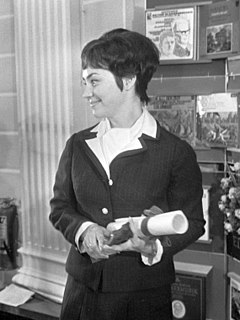Related Research Articles

Eugen Jochum was a German conductor, best known for his interpretations of the music of Anton Bruckner, Carl Orff, and Johannes Brahms, among others.

Dietrich Fischer-Dieskau was a German lyric baritone and conductor of classical music, one of the most famous Lieder performers of the post-war period, best known as a singer of Franz Schubert's Lieder, particularly "Winterreise" of which his recordings with accompanists Gerald Moore and Jörg Demus are still critically acclaimed half a century after their release.
Der Besuch der alten Dame is an opera in three acts by Gottfried von Einem to a German libretto by Friedrich Dürrenmatt, based on his 1956 play of the same name.
The Gramophone Classical Music Awards, launched in 1977, are one of the most significant honours bestowed on recordings in the classical record industry. They are often viewed as equivalent to or surpassing the American Grammy award, and referred to as the Oscars for classical music. They are widely regarded as the most influential and prestigious classical music awards in the world. According to Matthew Owen, national sales manager for Harmonia Mundi USA, "ultimately it is the classical award, especially worldwide."

Elisabeth Sara "Elly" Ameling is a retired Dutch soprano, who was particularly known for lieder recitals and for performing works by Johann Sebastian Bach. Performing with distinguished pianists and ensembles around the globe, she was awarded various honours and recording prizes.

Friedrich "Fritz" Karl Otto Wunderlich was a German lyric tenor, famed for his singing of the Mozart repertory and various lieder. He died in an accident aged 35.

Walter Berry was an Austrian lyric bass-baritone who enjoyed a prominent career in opera. He has been cited as one of several exemplary operatic bass-baritones of his era.
Júlia Várady is a Hungarian-born German soprano who started out as a mezzo-soprano.
Thierry Fischer is a Swiss orchestra conductor and flutist.

Edith Mathis is a Swiss soprano and a leading exponent of the works of Wolfgang Amadeus Mozart worldwide. She is known for parts in Mozart operas, but also took part in premieres of operas such as Henze's Der junge Lord.

Cyrano de Bergerac is a four-act opera with music by Franco Alfano, and libretto by Henri Caïn, based on Edmond Rostand's 1897 drama Cyrano de Bergerac.

Doktor Faust is an opera by Ferruccio Busoni with a German libretto by the composer, based on the myth of Faust. Busoni worked on the opera, which he intended as his masterpiece, between 1916 and 1924, but it was still incomplete at the time of his death. His pupil Philipp Jarnach finished it. More recently, in 1982, Antony Beaumont completed the opera using sketches by Busoni that were previously thought to have been lost. Nancy Chamness published an analysis of the libretto to Doktor Faust and a comparison with Goethe's version.

Palestrina is an opera by the German composer Hans Pfitzner, first performed in 1917. The composer referred to it as a Musikalische Legende, and wrote the libretto himself, based on a legend about the Renaissance musician Giovanni Pierluigi da Palestrina, who saves the art of contrapuntal music (polyphony) for the Church in the sixteenth century through his composition of the Missa Papae Marcelli. The wider context is that of the European Reformation and the role of music in relation to it. The character of Cardinal Borromeo is depicted, and a General Congress of the Council of Trent is the centrepiece of act 2.

Cardillac, Op. 39, is an opera by Paul Hindemith in three acts and four scenes. Ferdinand Lion wrote the libretto based on characters from the short story Das Fräulein von Scuderi by E. T. A. Hoffmann.

Lear is an opera in two parts with music by the German composer Aribert Reimann, and a libretto by Claus H. Henneberg, based on Shakespeare's tragedy King Lear.
Susan Gritton is an English operatic soprano. She was the 1994 winner of the Kathleen Ferrier Award and has sung leading roles in a wide-ranging repertoire from Handel and Mozart to Britten, Janáček and Strauss.
Wilhelm Schüchter was a German conductor. He was Generalmusikdirektor in Dortmund and left a legacy of opera recordings.

John James Fryatt was an English actor and opera singer best known for his performance in comic character roles.

Archiv Produktion is a classical music record label of German origin. It originated in 1949 as a classical label for the Deutsche Grammophon Gesellschaft (DGG), and in 1958 Archiv was established as a subsidiary of DGG, specialising in recordings of Early and Baroque music. It has since developed a particular focus on "historically informed performance" and the work of artists of the Early music revival movement of the 20th and 21st centuries.
Reinhard Peters was a German operatic conductor, violinist and an academic teacher at the Folkwangschule Essen. He was the Generalmusikdirektor for the opera companies Deutsche Oper am Rhein, Theater Münster and Deutsche Oper Berlin. He premiered music in opera and concert, such as Giselher Klebe's Die tödlichen Wünsche, Aribert Reimann's Melusine, Nicolas Nabokov's Love's Labour's Lost, and Wilhelm Killmayer's song cycle Tre Canti di Leopardi.
References
- 1 2 3 Perroux, Alain (2011). "A new world of sound: Frank Martin's Der Sturm", booklet notes to Hyperion CDA67821/3. Hyperion Records. Accessed 4 June 2021.
- 1 2 Casaglia, Gherardo (2005). "Der Sturm, 17 June 1956" . L'Almanacco di Gherardo Casaglia (in Italian).
- ↑ "Martin, Frank – Ansermet, Ernest – Concert Program World Premiere Der Sturm 1956", taminoautographs.com
- ↑ Clements, Andrew (26 May 2011). Martin: Der Sturm – review. The Guardian . Accessed 6 March 2012.
